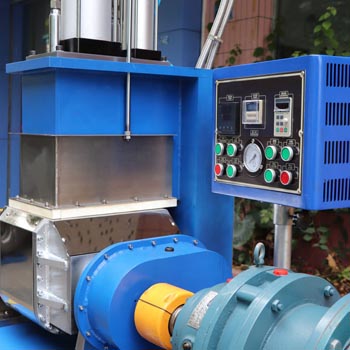In the world of materials processing, viscosity is a critical factor that determines the ease or difficulty of mixing, kneading, or dispersing substances. In many industries, like polymers, chemicals, silicone ,plastic ,ceramics, and pharmaceuticals ,it is usually need to handle strong viscosity materials, which are thick, sticky, and often hard to process. The question is: Can a lab dispersion kneader handle such materials effectively?
The answer is yes—if you choose the right type of lab dispersion kneader machine .
What Is a Lab Kneader?
A lab dispersion kneader is a compact, laboratory-scale mixing machine which are specially designed to simulate industrial kneading and mixing processes on a small scale. It typically adopt two counting Z-type sigma blades rotating in a horizontal chamber , in order to shear and mix high-viscosity materials under controlled temperature and pressure conditions.
For this lab dispersion kneader , it creates a perfectly homogeneous mixture with the right rheology for the application .
Thanks to its special design , this lab dispersion kneader enables you to explore a multitude of combinations. It offers laboratories and manufacturers the ideal solution for continuous processes involving high-viscosity materials and the dispersion kneader is the ideal solution for improving the efficiency of your formulations and processes.
Why Lab Kneaders Are Ideal for Strong Viscosity Materials
1. Powerful Shear Mixing Capability
Lab dispersion kneaders are specifically designed to mix highly viscous or plastic-like materials such as silicone rubber, plasticine, adhesives, epoxy compounds, and other material etc. When the two counting blade start rotating ,they generate strong shear forces, which ensure complete mixing even when the material resists flow.
Constructed for heavy-duty mixing and lower maintenance, the lab dispersion kneader machine feature hardened mixing rotors and abrasion hardened stainless steel mixing chamber with leak-proof construction.
2. Controlled Heating and Cooling
Usually , the high-viscosity materials are temperature-sensitive. While the lab dispersion kneaders usually come with jacketed mixing chambers which thus allow for precise temperature control—either through electric heating or water circulation. This helps to soften stiff materials and enhance flow characteristics.
3. Vacuum and Pressure Options
As special requirement , some advanced lab dispersion kneaders are equipped with vacuum systems ,which can remove air bubbles. This function is very crucial to achieve a dense and uniform compound. Therefore ,this vacuum lab kneader are widely used for research and development to prepare materials with high viscosity .They can also operate under pressure to simulate real production environments.
4. Custom Blade Speed and Torque
It is the fact that high-viscosity materials require not just necessarily high speed,but high torque. Thus , the Lab dispersion kneaders offer customizable blade speeds, which allow users to custom the setting for the most suitable rotation speed ,so that mix the material efficiencly without overloading the motor.
So Which High-Viscosity Materials Can A Lab Kneader Process ?
Here are just few example:
* Silicone rubber compounds
* EVA-based hot melt adhesives
* Butyl rubber
* Ceramic pastes and slurries
* Battery electrode pastes
* Ink pigments and colorants
* Thermoplastic resins
* Reactive polymers
Limitation Need To Consider Lab Kneader for High-Viscosity
Although the lab kneader are specially design and tailored for high viscosity material , users still need to consider some limitation of this lab kneader ,for example :
* Chamber volume: Overloading can lead to poor dispersion or motor stress.
* Material reactivity: Choose blade materials and coatings compatible with reactive chemicals.
* Cleaning: Highly viscous materials may require more effort to clean from internal surfaces.
In conclusion, Lab dispersion kneaders are essential equipment to process for strong viscosity materials, its feature can be tailored as specific material ,such as its mixing design, rotor material ,processing technique ,temperature control etc.
In addition ,this lab kneader also can be equipped with programmable, user-friendly controls, optional control programs ,which can provide process control based on times, temperatures, or amp draws. Automated charging systems are also available as an option.
Whether you’re developing new polymer compounds or experimenting with ceramic pastes, a well-equipped lab dispersion kneader machine will offer the performance and high precision that you need.
If you’re working with high-viscosity materials in a laboratory setting, investing in the right lab dispersion kneader can save time, reduce material waste, and enhance product consistency.
Talk with our experts now ,and we would be very pleased to help you .







